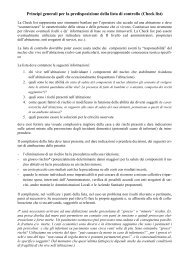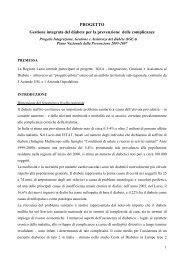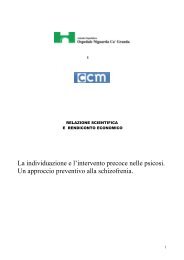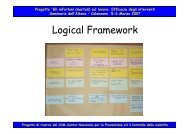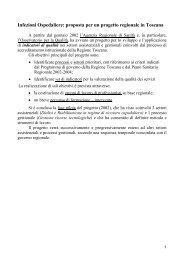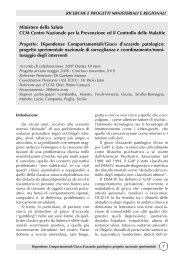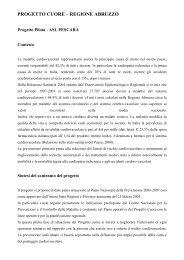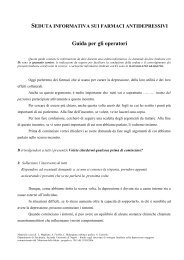Gaining health : analysis of policy development in European ...
Gaining health : analysis of policy development in European ...
Gaining health : analysis of policy development in European ...
Create successful ePaper yourself
Turn your PDF publications into a flip-book with our unique Google optimized e-Paper software.
Chapter 3<br />
20<br />
develop<strong>in</strong>g methodologies for carry<strong>in</strong>g out <strong>health</strong> impact<br />
assessment (HIA) (29).<br />
Article 152 <strong>of</strong> the Treaty <strong>of</strong> Amsterdam states that “a high<br />
level <strong>of</strong> human <strong>health</strong> protection shall be ensured <strong>in</strong> the<br />
def<strong>in</strong>ition and implementation <strong>of</strong> all Community policies<br />
and activities” (30). This was reflected <strong>in</strong> the ensu<strong>in</strong>g<br />
public <strong>health</strong> strategies and programmes for the <strong>European</strong><br />
Community, which aim to tackle the underly<strong>in</strong>g causes <strong>of</strong><br />
ill <strong>health</strong>. Health <strong>in</strong> all policies (31) was given high visibility<br />
<strong>in</strong> 2006, when F<strong>in</strong>land made it the ma<strong>in</strong> theme <strong>of</strong> its EU<br />
presidency.<br />
The pr<strong>in</strong>ciple <strong>of</strong> subsidiarity, def<strong>in</strong>ed <strong>in</strong> Article 5 <strong>of</strong> the<br />
Treaty establish<strong>in</strong>g the <strong>European</strong> Community, is <strong>in</strong>tended to<br />
ensure that decisions are taken as closely as possible to the<br />
citizen (32). In tackl<strong>in</strong>g NCD, action should be taken at the<br />
lowest possible level, close to the citizen, counterbalanc<strong>in</strong>g<br />
what is frequently a top-down approach.<br />
Socioeconomic status <strong>in</strong> childhood, as <strong>in</strong>dicated by the<br />
parents’ occupational class, frequently determ<strong>in</strong>es socioeconomic<br />
status <strong>in</strong> adulthood. Lifelong exposure to low<br />
socioeconomic status carries higher risks <strong>of</strong> ill-<strong>health</strong> than<br />
does such exposure for only one stage <strong>of</strong> life (23). Many<br />
<strong>health</strong>-related types <strong>of</strong> behaviour, such as eat<strong>in</strong>g habits and<br />
smok<strong>in</strong>g, are formed <strong>in</strong> childhood or adolescence. Specific<br />
life events, such as unemployment or the loss <strong>of</strong> a spouse,<br />
also have significant effects on <strong>health</strong>. Furthermore, the<br />
exposure <strong>of</strong> men and women and <strong>of</strong> people <strong>in</strong> different<br />
age groups to <strong>health</strong> determ<strong>in</strong>ants such as low <strong>in</strong>come and<br />
unemployment differ considerably. Consequently, it is considered<br />
essential that NCD policies take a life course and<br />
gender perspective.<br />
For these reasons, therefore, it was considered essential<br />
to exam<strong>in</strong>e the experience <strong>of</strong> NCD <strong>policy</strong> <strong>development</strong> <strong>in</strong><br />
countries through the prism <strong>of</strong> such values and pr<strong>in</strong>ciples.<br />
Carry<strong>in</strong>g out the case studies<br />
For countries for which <strong>in</strong>formation was available, the <strong>in</strong>itial<br />
assessment was made on the basis <strong>of</strong> exist<strong>in</strong>g <strong>policy</strong> documents,<br />
related bibliographies and material available on the<br />
Internet. The first draft was submitted to key <strong>in</strong>formants <strong>in</strong><br />
the country for comments. In countries where such <strong>in</strong>formation<br />
is not yet well developed, <strong>in</strong>terviews took place at a<br />
prelim<strong>in</strong>ary stage <strong>in</strong> order to provide the basic <strong>in</strong>formation<br />
for the first draft.<br />
In all eight countries, <strong>in</strong>formation from written material<br />
was complemented by semi-structured <strong>in</strong>terviews with<br />
key <strong>in</strong>formants. A revised draft was then sent back to the<br />
countries to check for possible <strong>in</strong>accuracies.<br />
The key <strong>in</strong>formants <strong>in</strong>terviewed or provid<strong>in</strong>g comments<br />
on the drafts were ma<strong>in</strong>ly civil servants and experts <strong>in</strong><br />
m<strong>in</strong>istries <strong>of</strong> <strong>health</strong> and other organizations, academics<br />
and researchers (see Appendix 1). Members <strong>of</strong> NGOs<br />
were <strong>in</strong>terviewed <strong>in</strong> an attempt to reach people outside<br />
the government system. Many <strong>of</strong> those <strong>in</strong>terviewed had<br />
been directly <strong>in</strong>volved <strong>in</strong> the <strong>development</strong> <strong>of</strong> the policies<br />
exam<strong>in</strong>ed. Given the different phases and patterns <strong>of</strong> NCD<br />
<strong>policy</strong> <strong>development</strong> <strong>in</strong> the eight countries, the common<br />
outl<strong>in</strong>e for the semi-structured <strong>in</strong>terviews was <strong>in</strong>tended as<br />
a checklist <strong>of</strong> the ma<strong>in</strong> issues to be covered rather than a<br />
restrictive structure.<br />
Data collection<br />
Information from WHO<br />
This <strong>in</strong>cluded:<br />
• responses by <strong>European</strong> countries to surveys carried<br />
out by WHO headquarters and the Regional Office on<br />
NCD <strong>policy</strong> and their risk factors;<br />
• country pr<strong>of</strong>iles prepared by WHO, such as the Highlights<br />
on Health (33) and HiTs (34);<br />
Methodology, underly<strong>in</strong>g concepts and values



